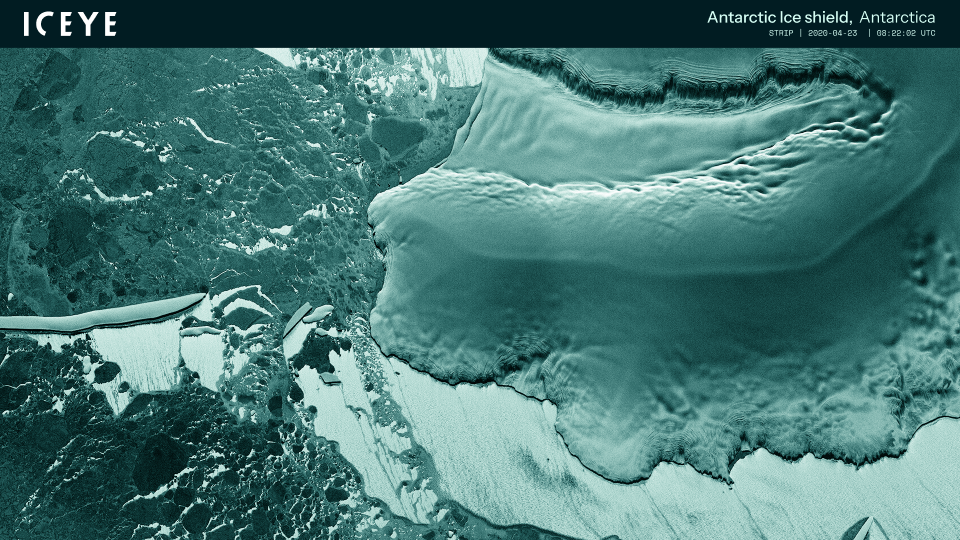Contact us
Get in touch with our experts to find out the possibilities daily truth data holds for your organization.
Persistent Monitoring
Natural catastrophe solutions

ICEYE’s journey started ten years ago with an idea to monitor the movements of the Arctic ice – that is where the company name comes from. Combined with our vision to improve life on Earth by becoming a global source of truth, the protection of Arctic nature is close to ICEYErs hearts. That’s why the WWF’s Arctic Programme was the clear choice when we asked our people to cast their vote on the target of our nature conservation work.
As of 2024, ICEYE cooperates with WWF Finland and the global Arctic Programme to protect whale migration routes in the Arctic region. Every year, tens of thousands of whales migrate long distances to and from the Arctic Ocean in search of the right conditions for feeding, mating, and giving birth. These underwater migration routes, also known as blue corridors, are vital for almost a third of the world's whale species.
Blue corridors are threatened by the warming of the Arctic
Whales follow the sea ice, traveling thousands of kilometers on their underwater migration routes. They use signs of the changing of seasons to make sure they are in the right place at the right time of year. But with the intense warming of the Arctic region, whales’ navigation is becoming increasingly difficult.
Sea ice loss is bringing more ships to the region, extending shipping seasons, and opening new routes. Increased maritime traffic means more underwater noise and a higher risk of oil spills and lethal collisions.
Whales are vital for the health of the oceans. At the top of the marine food chain, they are fundamental to the survival of other species and entire ecosystems. They also contribute to the fight against climate change by sequestering carbon from the atmosphere – one whale can capture an average of 30 tons of carbon dioxide over its lifespan.
According to WWF, seven out of the 13 great whale species are endangered or vulnerable. The urgency to protect their natural environments has never been greater.
Piloting innovative solutions to monitor and manage blue corridors
WWF’s Arctic Programme is working to safeguard migrating whales in line with the UN Global Biodiversity Framework (GBF). The Arctic Blue Corridors project increases information about the migration routes, pilots innovative solutions for monitoring, and advocates for conservation measures in cooperation with the shipping sector.
As part of the cooperation, ICEYE will explore how synthetic aperture radar (SAR) satellite images could be used to identify and protect the migration routes of whales. ICEYE operates the world's largest fleet of SAR satellites that enable constant observation of the Earth – day and night, in all weather conditions, and both on the ground and in marine environments.
ICEYE’s solutions are widely used to monitor natural disasters like floods and wildfires, enabling faster response and recovery. SAR data from the ICEYE constellation can be produced over wide areas, such as glacial regions or coastlines, to effectively detect oil spills and mitigate threats in marine environments. Read more about the applications of SAR data and solutions.
Earth observation data enables sustainable decision-making
ICEYE aims to transform decision-making with reliable and timely information about the events on Earth. Data is also the key to tackling complex sustainability challenges. Monitoring climate-related issues such as deforestation in the Amazon or melting of the Arctic sea ice will help us understand how our actions affect natural resources and living conditions on Earth.
"Through the cooperation with WWF Finland and the Arctic Programme, ICEYE can contribute to the preservation of biodiversity and the natural environment beyond our own operations and value chain," said Milla Uusi-Pietilä, Sustainability Lead at ICEYE.
Visit sustainability at ICEYE to learn more about our environmental efforts, and how we aim to fulfill our mission – improve life on Earth by becoming the global source of truth.
28 October 2025
Flood Ready: How insurers can act faster with satellite insights
Discover how satellite flood monitoring helps insurers gain real-time situational awareness and...
Read more about Flood Ready: How insurers can act faster with satellite insights →15 October 2025
From forecast to fact: Multi-peril data for insurers
ICEYE's Monte Carlo workshop revealed how SAR satellite data transforms hurricane response and...
Read more about From forecast to fact: Multi-peril data for insurers →11 June 2025
6 Data-driven strategies emergency managers should use for hurricane preparedness
How Emergency Managers can ensure data readiness ahead of hurricane seasons.
Read more about 6 Data-driven strategies emergency managers should use for hurricane preparedness →